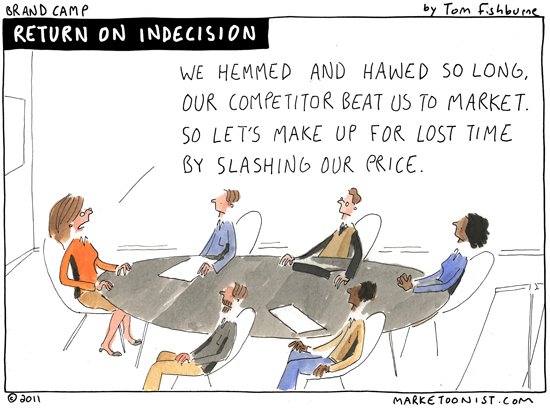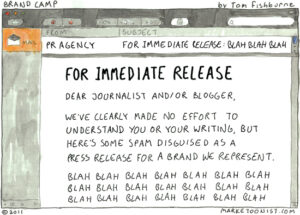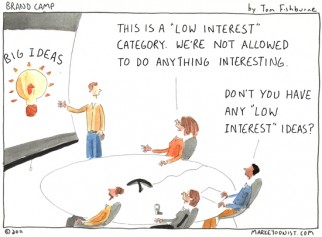I spent a few days in Vermont last week with Eureka Ranch founder, Doug Hall. At one point, Doug said, “if you’re not meaningfully unique, you better be cheap”.
Any idea that is “meaningfully unique” is inherently risky because by definition you can’t point to a precedent in the market. You have to step into the unknown, which is uncomfortable.
When many companies are faced with the unknown, they freeze. They spend hours debating potential scenarios and are incapable of making the go/no go decision. Sometimes this indecisive period lasts months or longer.
One of my previous managers was king of the debate club method of decision-making. His whole team would war-game scenarios for hours until our craniums hurt and still get no closer to launching our idea. Debate club would reconvene again and again, all while the clock ticked.
Instead of arguing from a conference room table, agree to the biggest areas of risk and frame a few experiments to learn about that risk. Get your idea or a form of your idea into the market as quickly as possible. As WordPress founder Matt Mullenweg said, “usage is like oxygen for ideas”. Once you’ve tested what you can test, bite the bullet and make the decision. There’s only so much you can learn by debating.
Companies measure project return by many dimensions: return on investment, return on capital, return on equity, etc. Return is not just a factor of what projects you invest in, but how you execute them.
There is also a cost to being indecisive.



Bill Carlson says
“Ready, Fire, Aim!”
There’s probably not any universally right or wrong approaches to balancing smart, meaningful due diligence before acting versus risks of delay and/or failure, but at some point somebody has to have a combination of courage and authority for making a decision to proceed.
In today’s business climate, however, two things I’ve seen happening: 1) over-aggressiveness — “want it, want it NOW” mentality based on a sense that every second is critical even though rushing things increases likelihood of errors; and 2) fear — desire for CYA (protect my job!) analysis to justify decisions can delay those decisions to a point where the delay itself becomes a factor in the calculation of success.
Certainly not advocating consistent “shoot from the hip” decision-making but perhaps company leadership needs to (once again) be willing to roll with a reasonable batting average (requiring patience over time) rather than expect home runs every time up. And the more times that batter faces a pitcher, the better they get in anticipating and hitting pitches.
Freeing people to make decisions will yield motion and once in motion, adjustments can be made to improve direction.
Anne says
Keeping in mind that any marketing lever can only influence 10% of total sales in the market since the category framework determines 90% of the results could probably help the product teams to put ressources where it will bring return rather than wasting incredible amount of time on go/no go.
But that would also probably hurt the morale of the marketing team to know the limitations of their efforts 🙂
for more details on double jeopardy:
http://en.wikipedia.org/wiki/Double_jeopardy_(marketing)